| 6 March |
• yesterday • tomorrow |

• Coleta
• Colette Boylet
• Collette of Corbie
• Nicholette Boilet
• Nicolette
7 February (Franciscans, Capuchins)
Carpenter's daughter whose parents were near 60 at her birth. Colette was orphaned at age 17, and left in the care of a Benedictine abbot. Her guardian wanted her to marry, but Colette was drawn to religious life. She initially tried to join the Beguines and Benedictines, but failed in her vocation. Franciscan tertiary. Hermitess. On 17 September 1402, at age 21, she became an anchoress - walled into a cell whose only opening was a grilled window into a church.
She had visions in which Saint Francis of Assisi ordered her to restore the Rule of Saint Clare to its original severity. When she hesitated, she was struck blind for three days and mute for three more; she saw this as a sign to take action.
Colette tried to follow her mission by explaining it, but had no success. Realizing she needed more authority behind her words, she walked to Nice, France, barefoot and clothed in a habit of patches, to meet Peter de Luna, acknowledged by the French as the schismatic Pope Benedict XIII. He professed her a Poor Clare, and was so impressed that he made her superioress of all convents of Minoresses that she might reform or found, and a missioner to Franciscan friars and tertiaries.
She travelled from convent to convent, meeting opposition, abuse, slander, and was even accused of sorcery. Eventually she made some progress, especially in Savoy, where her reform gained sympathizers and recruits. This reform passed to Burgundy in France, Flanders in Belgium and Spain.
Colette helped Saint Vincent Ferrer heal the papal schism. She founded seventeen convents; one branch of the Poor Clares is still known as the Colettines.
She was known for a deep devotion to Christ's Passion with an appreciation and care for animals. Colette fasted every Friday, meditating on the Passion. After receiving Holy Communion, she would fall into ecstasies for hours. She foretold the date of her own death.
13 January 1381 at Corbie, Picardy, France as Nicolette Boilet, named in honor of Saint Nicholas of Myra
• 6 March 1447 at Ghent, Belgium of natural causes
• relics at the Monastère Sainte-Claire, Poligny, France
24 May 1807 by Pope Pius VII
• against eye disorders
• against fever
• against headaches
• against infertility
• against the death of parents
• craftsmen
• Poor Clares
• servants
• Corbie, France
• Ghent, Belgium
• birds
• lamb
• woman being carried to heaven by an angel
• woman delivering a soul from purgatory
• Poor Clare nun holding a crucifix and a hook
• Poor Clare nun visited by Saint Anne, Saint Francis of Assisi, and/or Saint Clare of Assisi in a vision
• Poor Clare nun walking on a stream
We must faithfully keep what we have promised. If through human weakness we fail, we must always without delay arise again by means of holy penance, and give our attention to leading a good life and to dying a holy death. May the Father of all mercy, the Son by his holy passion, and the Holy Spirit, source of peace, sweetness and love, fill us with their consolation. Amen. - Saint Colette, in her spiritual testament to her sisters
If there be a true way that leads to the Everlasting Kingdom, it is most certainly that of suffering, patiently endured. - Saint Colette
https://catholicsaints.info/saint-colette/

Chrodegand, Chrodegangus, Chrodegrang, Chrodegrangus, Chrodogand, Chrodogandus, Chrotgang, Chrotgangus, Droctegangus, Godegrand, Godegrandus, Grodegandus, Grodegangus, Grodogangus, Gundigran, Krodegandus, Ratgang, Rodigang, Rudigangus, Ruggandus, Ruodgangus, Ruotgangus, Rutgangus, Sirigang and Sirigangus
3 October (Augustinians)
Son of Sigram and Landrada; related to Pepin the Short; brother of Saint Opportuna of Montreuil. Educated at Saint Trond abbey. Secretary to Charles Martel. Chancellor of France. Even while holding such positions, he went about in hair shirts, fasting, praying, and supporting the poor. Bishop of Metz, France in 742 even though he was still a layman. Chief minister to Pepin the Short. Ambassador to the Vatican. Mayor of the Palace. Involved in the coronation of Pepin as King of the Franks, the first Carolingian king. Defended Rome and the papacy against the Lombards. Worked to reform the Frankish Church, including educating the clergy, and encouraging them to live in communities based largely on the Benedictine Rule. Founded and restored churches and monasteries. Introduced the Roman liturgy and Gregorian Chant to his see, from which they spread to other parts of Europe. Participated in several councils.
c.714 at Hesbaye, Brabant, near Liege, Belgium
• 6 March 776 at Metz, France
• relics, in the Benedictine Abbey of Saint-Symphorien, were destroyed during the French Revolution
https://catholicsaints.info/saint-chrodegang-of-metz/

• Apostle of the Upper Rhine
• Fridolin Vandreren of Säckingen
• Irish Wanderer
• Fidold, Fridolinus
Born to the Irish nobility, he became a Benedictine monk at Luxeuil Abbey and at Poitiers, France. Reported to have been present at the baptism of Frankish king Clovis on Christmas day in 496. Fridolin received a vision of Saint Hilary of Poitiers in which he was shown the location of Hilary‘s relics, which had been lost during a Vandal invasion. Fridolin found the relics, and built a chapel to house them. He built churches in Alsace, in Switzerland, and in Burgundy, and became an evangelizing missionary among the Alamanni in the Upper Rhine area of modern Germany; many thought he was a roaming cattle thief, and chased him away. He founded the monastery in Säckingen, Baden (part of modern Germany, and served as its abbot. On the date of his feast, the houses of Säckingen are decorated with the flags of Germany, Switzerland, and Ireland.
Irish
• c.540 at Säckingen, Germany of natural causes
• buried in Säckingen
• for good weather
• carpenters
• cattle
• Alsace, France
• Glarus, Switzerland
• Säckingen, Germany
• Strasbourg, France
• abbot leading a skeleton by the hand
• pilgrim with a staff and book
https://catholicsaints.info/saint-fridolin/

• Rose of Vieterbo
• Rosa
4 September (translation of relics; in Viterbo, Italy; Franciscans)
Franciscan tertiary. At age three she brought a person back from death. Preached in the streets from age ten and led public processions praising Christ. Prophetess and subject to visions. Had the friendship of birds. Was repeatedly refused entrance to the Poor Clares, and in 1250 she was exiled for supporting the pope against Frederick II. After her death, Pope Alexander IV ordered her body laid to rest in the convent that had refused her.
1234 at Viterbo, Italy
6 March 1252 of natural causes
1457 by Pope Callistus III
• exiles
• people rejected by religious orders
• tertiaries
• Alcolea, Spain
• Viterbo, Italy
https://catholicsaints.info/saint-rose-of-viterbo/
Born to the nobility. One of the first 12 followers of Saint Francis of Assisi, and first priest in the Franciscan Order. Sylvester once sold Francis stone to rebuild a church. A short while later, he saw Francis and Bernard of Quintavalle distributing Bernard's wealth to the poor. Sylvester complained that he had been poorly paid for the stone, and asked for more money. Francis obliged. But the handful of money soon filled Sylvester with guilt. He sold his possessions, began a life of penance, and joined Francis' community. A holy and prayerful man, Sylvester travelled with Francis, and became his advisor. It was Sylvester and Clare who answered Francis' query with the response that he should serve God by going out to preach rather than by devoting himself to prayer. In a city involved in a civil war, Francis ordered Sylvester to drive the devils out. At the city gate Sylvester cried out: "In the name of almighty God and by virtue of the command of his servant Francis, depart from here, all you evil spirits." Peace returned to the city.
• 1240
• buried in the Basilica of Saint Francis in Assisi, Italy
https://catholicsaints.info/saint-sylvester-of-assisi/

• Ollegarius Bonestruga
• Ollegarius of Barcelona
• Olaguerand, Oldegar, Olegari, Olegarius, Oligarius, Oleguer, Olegario, Ollegario
Augustinian canon regular. Prior of a succession of monasteries in France. Bishop of Barcelona, Spain in 1115. Archbishop of Tarragona, Spain in 1116. Revived and rebuilt the diocese from the sorry state in to which it had fallen during the Moorish occupation.
1060 at Barcelona, Spain
• 1137 of natural causes
• interred in the side chapel of Christ of Lepanto, cathedral of Barcelona, Spain
• body incorrupt
25 May 1675 by Pope Clement X
https://catholicsaints.info/blessed-ollegarius-of-tarragona/
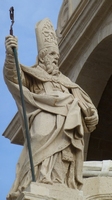
Marciano, Marcianus, Martianus, Marzano, Marziano
Convert, brought to the faith by Saint Barnabas the Apostle. Evangelist in and first bishop of Tortona, Italy where he served for 45 years. Martyred in the persecutions of Hadrian. May be the same as Saint Marcian of Ravenna.
• crucified c.119
• buried by Saint Secundus of Asti
• grave re-discovered in the 4th century, reportedly by angelic intervention
• relics in the cathedral of Our Lady of the Assumption and Saint Lawrence in Tortona, Italy
• Genola, Italy
• Tortona, Italy
https://catholicsaints.info/saint-marcian-of-tortona/
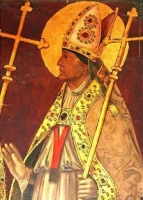
Parents may have been Jewish, but Julian was raised Christian. Well educated at the local cathedral school. Monk at Agali, Spain. Spiritual student of Saint Eugene II, Archbishop of Toledo, Spain. Abbot at Agali. Archbishop of Toledo in 680. First bishop with primacy over the entire Iberian peninsula, and helped centralize the Spanish Church in Toledo. Presided over several councils and synods. Revised the Mozarbic liturgy. Voluminous writer whose works include Prognostics, a volume on death, and a biography of Visigoth King Wamba. An odd mixture, he was known as a kind and gentle man - but encouraged Spanish kings to deal harshly with Jews.
642
690 at Toledo, Spain of natural causes
https://catholicsaints.info/saint-julian-of-toledo/

• Balther of Tinningham
• Balther of Tyninghame
• Balthere, Balred, Balredus, Baltherus, Balterus, Baldred, Baldredus, Bilfrid, Billfrith
Benedictine hermit at Lindisfarne and Bass Rock, Northumbria, England. He was an expert gold and silversmith who worked with Bishop Eaddfrid to create the bindings of the Lindisfarne Gospels in gold, silver, and gems.
c.680 in Ireland
• 756 of natural causes
• remains enshrined at the Cathedral of Durham, England in the 11th century
https://catholicsaints.info/saint-balther-of-lindisfarne/
• Cyriacus of Trèves
• Ciriaco, Kiriacus, Kyriacus, Kyriakos, Quiriaco, Quiriacus, Quiriakus
20 September (translation of relics)
Priest. Friend of and assistant to Saint Maximinus of Trier. Known to spend all night in prayer vigils.
3rd century Poitiers, France
• 4th century of natural causes
• buried in the Basilica of Saint Maximinus in Trier, Germany
• some relics transferred to Taben-Rodt, Germany
against childhood diseases (a result of many such miracles at his tomb)
https://catholicsaints.info/saint-cyriacus-of-trier/
Priest. Teacher. Prior. Known to have had a great devotion to Our Lady. Delegate from emperor to the papal court. Worked for the union of the Greek and Latin Churches. When he became persecuted by the Patriarch of Constantinople, he retired to Mount Carmel and became a Carmelite. Prior of three years, and chosen General of the Carmelites. Had the gift of prophecy. Wrote a work on the procession of the Holy Ghost. Earlier writers often confused him with Saint Cyril of Alexandria.
1126 at Constantinople
1224 of natural causes
https://catholicsaints.info/saint-cyril-of-constantinople/
Cyneburgh, Cyneburga
Daughter of Pendra of Mercia; her father was a pagan who fiercely opposed Christianity, but many in her family grew strong in the new faith – her sister was Saint Kyneswide, and she was related to Saint Tibba. Kyneburga became a Benedictine nun, and later founded and served as abbess of Dormancaster (now Castor) abbey in Northamptonshire, England.
in northern England
• c.680 of natural causes
• relics at Petersburough abbey
https://catholicsaints.info/saint-kyneburga-of-castor/
Baldred of Glasgow
Bishop of Strathclyde, Scotland; successor to Saint Kentigern. Founded monasteries, convents, and churches. Due to the civil disruptions of the day, late in life Baldred retired from his see and lived out his last days as a prayerful hermit on the coast of the Frith of Forth.
c.543 in Ireland
• c.607 at Aldhame, Haddingtonshire, Scotland of natural causes
• relics in various churches throughout Scotland
https://catholicsaints.info/saint-baldred-of-strathclyde/
Martyrs of Nikopolis
A group of Christians martyred together. No details about them have survived except the names – Alexander, Carisius (aka Catsius), Claudian (2 with this name), Diodorus, Jocundus, Mercurius, Nikephoros, Papias, Saturninus, and Viktor.
Nicopolis, Bithynia, Asia Minor (in modern Turkey), date unknown
https://catholicsaints.info/martyrs-of-nicopolis-6-march/
Bishop of Malaga, Spain. At one point he was forced to flee to Auvergne, France to escape persecution. Little else is known about him.
at Malaga, Spain
c.307 in Auvergne, France of natural causes
• Pre-Congregation
• 26 April 1834 by Pope Gregory XVI (restoration of cultus)
https://catholicsaints.info/saint-patrick-of-malaga/
Anchoress at Hochsal, Waldshut in southern Germany.
11th century
• 1081 in Hochsal, Landkreis Waldshut, Baden-Württemberg, Germany of natural causes
• buried in the Kirchhof Sankt Pelagius in Hochsal, which became the site of pilgrimage until the 17th century
https://catholicsaints.info/blessed-mechthild-of-hochsal/
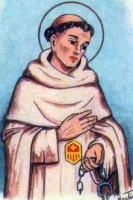
Mercedarian friar. Prior of the Mercedarian convent in Barcelona, Spain. Made two trips to north Africa to ransom Christians enslaved by Muslims, and brought 453 of them home.
in Barcelona, Spain of natural causes
https://catholicsaints.info/blessed-guillermo-giraldi/
Cathróe, Cadroe, Cadroë, Catroe, Cadroes, Cadroel, Codroel, Kaddroë
Prince. Studied in Arnagh, Ireland, in London, and in Fleury, France. Benedictine monk. Abbot of Waulsort monastery in Belgium. Abbot of Saint Clement's monastery, Metz, France.
Scottish
976 of natural causes
https://catholicsaints.info/saint-cadroe/
Evagrio, Euagrius, Evagrios
Priest. Bishop of Constantinople in 370 after the see had been vacant for 20 years due to Arian persecution. After a few months he was driven into exile by the Arian emperor Valens, and was never able to return.
https://catholicsaints.info/saint-evagrius-of-constantinople/
Cyneswith, Cyneswide, Kuneswide
Daughter of Pendra of Mercia, a fierce opponent of Christianity. Sister of Saint Kyneburga. Relative of Saint Tibba. Benedictine nun. Abbess at Dormancaster (now Castor) abbey in Northamptonshire, England.
https://catholicsaints.info/saint-kyneswide-of-castor/
General. He and 41 fellow Christian soldiers were captured by Caliph Montassem at Amorium, Syria in 836. They spent nine years in prison with alternating periods of torture and inducements to convert to Islam; in each case they refused. Martyr.
845
https://catholicsaints.info/saint-aetius/
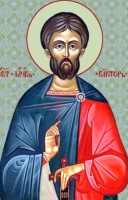
Martyr.
https://catholicsaints.info/saint-victorinus-of-nicomedia-2/
One of the many 5th-century holy men who immigrated from Ireland to the Brittany coast.
Ireland
485 in Plouzané, Brittany, France
Plouzané, France of natural causes
https://catholicsaints.info/saint-sananus/
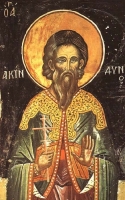
Martyr.
https://catholicsaints.info/saint-victor-of-nicomedia-2/
Baltherus
Eighth century hermit. Priest. Miracle worker.
England
756 of natural causes
https://catholicsaints.info/saint-baldred-the-hermit/
Bishop of Bologna, Italy for twenty years in the 4th century, appointed by Pope Saint Sylvester.
335 of natural causes
https://catholicsaints.info/saint-basil-of-bologna/
Claudian
Third-century layman, married to Saint Bassa of Nicomedia. Martyr.
https://catholicsaints.info/saint-claudianus-of-nicomedia/
Related to Saint Kyneswide and Saint Kyneburga. Benedictine nun at Dormancaster abbey, Northamptonshire, England.
https://catholicsaints.info/saint-tibba-of-castor/
Victor
Fifth century deacon of Piacenza, Italy.
https://catholicsaints.info/saint-vittore-of-piacenza/
Third-century lay woman, married to Saint Claudianus of Nicomedia. Martyr.
https://catholicsaints.info/saint-bassa-of-nicomedia/
Third century martyr in Africa in the persecutions Diocletian.
https://catholicsaints.info/saint-heliodorus-the-martyr/
Martyr in Milan, Italy in the persecutions of Diocletian.
https://catholicsaints.info/saint-venustus-of-milan/
Bishop.
Irish
https://catholicsaints.info/saint-bairfhion/
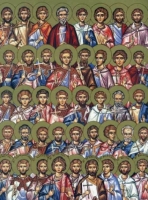
• Martyrs of Syria
• Martyrs of Samarra
A group of 42 Christian senior officials in the Byzantine empire who were captured by forces of the Abbasid Caliphate when the Muslim forces overran the city of Amorium, Phrygia in 838 and massacred or enslaved its population. The men were imprisoned in Samarra, the seat of the Caliphate, for seven years. Initially thought to be held for ransom due to their high position in the empire, all attempts to buy their freedom were declined. The Caliph repeatedly ordered them to convert to Islam, and sent Islamic scholars to the prison to convince them; they refused until the Muslims finally gave up and killed them. Martyrs.
We know the names and a little about seven of them,
• Aetios
• Bassoes
• Constantine
• Constantine Baboutzikos
• Kallistos
• Theodore Krateros
• Theophilos
but details about the rest have disappeared over time. However, a lack of information did not stop several legendary and increasingly over-blown “Acts” to be written for years afterward. One of the first biographers, a monk name Euodios, presented the entire affair as a judgement by God on the empire for its official policy of Iconoclasm.
• beheaded on 6 March 845 in Samarra (in modern Iraq) on the banks of the Euphrates river by Ethiopian slaves
• the bodies were thrown into the river, but later recovered by local Christians and given proper burial
large group of men (the head count varies) dressed as imperial Byzantine courtiers
https://catholicsaints.info/martyrs-of-amorium/
Twelve Christians who were martyred together in Italy, date and exact location unknown. We know nothing else but the names – Charistus, Diodorus, Donatus, Filagon, Lanulus, Nigorus, Permias, Petronius, Plamfagonus, Silvanus, Vibianus and Victorinus.
https://catholicsaints.info/martyrs-of-italy/
• Cairpre Crom of Clonmacnoise
• Pontius de Polignac
CatholicSaints.Info Portable Edition